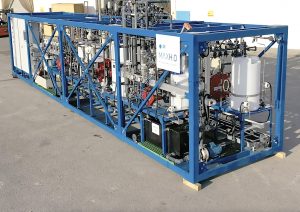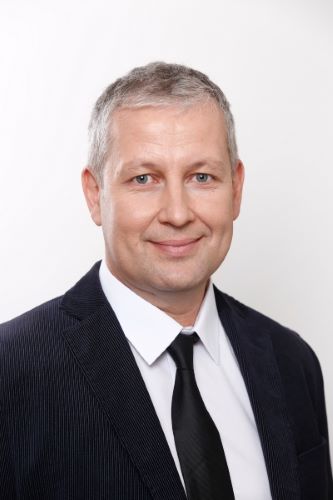As global water demand rises and natural freshwater sources become increasingly scarce, .
Wastewater Treatment Solutions: What Will Change in 2024?

In the face of escalating environmental challenges and the surging demand for water resources, industrial wastewater treatment solutions stand at the forefront of global priorities. As the world grapples with population growth, urbanization, and industrial expansion, the strain on water supplies intensifies, posing a threat to both human health and ecosystem sustainability. Innovative solutions in wastewater treatment have become an imperative, transcending local concerns to address a pressing global need. Innovative, sustainable wastewater treatment solutions not only play a pivotal role in safeguarding public health by ensuring access to clean water but also contribute significantly to the preservation of ecosystems and the overall resilience of our planet. Let’s dive into an analysis of the major trends which will impact industrial wastewater treatment in 2024:
The Quest for ZLD
Over the past two years, we have witnessed a significant surge in requests for high recovery systems and Zero Liquid Discharge (ZLD), particularly emanating from the semiconductor industry. This heightened demand is a direct response to regulatory pressures. Semiconductor firms are driven by the imperative to minimize risk. Disposing of waste that contains PFAS or other hazardous materials poses a regulatory hazard, with the potential consequence of plant shutdowns and the halting of entire production processes. In a strategic move to mitigate this regulatory risk, companies in the semiconductor sector are opting for ZLD. Despite the associated costs, this approach is deemed a risk-mitigating measure. By implementing ZLD, these companies not only leverage established technologies but also ensure the production of clean water, a critical element in their manufacturing processes.
Net-Positive Water Balance
An emerging trend involves companies aspiring to enhance their water balance, striving to achieve a net-positive status in water consumption. Opting for a high recovery solution becomes pivotal in this pursuit, as it enables them to intake less water while extracting a greater volume than conventional processes. IDE’s MAX H2O Desalter and PFRO are such solutions that stand out in realizing this objective. With an assurance of the highest recovery rate, our solutions are applicable to both industrial and municipal streams. Its application aims to minimize liquid discharge, promoting the recovery of municipal and industrial effluent streams, thereby contributing to the generation of clean water for reuse.

MaxH2O Desalter
The Brine Dilemma
The brine factor serves as a significant catalyst for wastewater innovation. Numerous industrial operations situated far from the sea encounter challenges in dealing with brine. Disposing of brine into lakes, rivers, or reservoirs isn’t a viable option for them. The alternatives include costly methods like deep well injection or trucking out the brine. In 2024, I suspect we will see more plants exploring technological solutions for brine minimization and treatment to address these disposal challenges effectively.
The Illusive Price of Water
In various regions globally, including certain sections of the U.S. and numerous areas in Europe, the cost of water remains relatively inexpensive and is often disconnected from its actual market value. Consequently, numerous facilities or processes that have substantial water requirements, and could potentially benefit from water treatment solutions, are not actively seeking such solutions and instead, opt to procure their water intake at lower tariffs. However, with the ongoing global climate crisis and the resultant strain on water resources, there is an anticipation that even these water-secure territories will eventually reconsider their approach and may become more open to adopting new technologies.
Forever Chemicals Everywhere
The proliferation of PFAS regulations is a growing concern, necessitating industrial operations to embrace high recovery solutions. Membrane-based solutions, such as reverse osmosis (RO), have emerged as particularly effective in addressing this challenge. These innovative technologies have demonstrated their capability to concentrate PFAS from water sources and subsequently eliminate them, aligning with the evolving regulatory landscape. The heightened focus on PFAS underscores the industry’s commitment to environmental stewardship and compliance, urging organizations to explore advanced water treatment solutions to ensure the removal of these persistent contaminants from wastewater streams. As regulatory scrutiny intensifies, the adoption of high recovery and membrane-based wastewater treatment solutions will become imperative for industries seeking to uphold environmental standards and safeguard public health.
Sustainable Solutions: A Quest for Excellence
Integrating sustainability goals and ESG principles into corporate strategies is no longer an option but a fundamental necessity for organizations striving to thrive in 2024. Through comprehensive research, development, and innovative thinking, we are steadfastly committed to developing environmental solutions that cater to the ever-growing needs of the industry. Our initiatives span a diverse range, encompassing solutions that harness green energy sources, pioneering on-site chemical production from seawater, and advancing carbon capture technologies. At IDE, we are dedicated to assisting our customers in meeting environmental regulations and achieving their ESG goals.
Emerging Technologies in Wastewater Treatment
As the pursuit of higher wastewater recovery becomes more challenging, it necessitates the development of advanced equipment, primarily in the form of membranes that are not only durable and energy efficient but also constructed from different polymers capable of operating effectively in high fouling conditions.
Furthermore, I anticipate significant advancements in system control, data analysis, and automation. The wastewater treatment plant generates a substantial amount of data, and with the integration of advanced technology and AI, we can harness this data to construct sophisticated models for enhanced operational efficiency and effectiveness.
Wastewater Treatment Solutions – The Key to a Sustainable Future
Wastewater treatment exemplifies a harmonious balance between human development and environmental preservation, emphasizing the critical importance of adopting cutting-edge technologies and sustainable practices. In this dynamic landscape, the quest for innovative wastewater treatment solutions is more than a scientific endeavor, it’s a collective responsibility to safeguard our precious water resources and forge a sustainable future for generations to come. At IDE, we navigate the complexities of wastewater treatment, working hand in hand with our customers to not only meet the challenges of today but also contribute to a sustainable tomorrow.
Learn how to solve your wastewater treatment challenges.
















